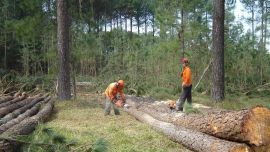This week the Times sat down to talk with Jacqueline O’Halloran, Ireland’s current ambassador to Argentina, Bolivia, Paraguay, and Uruguay. Appointed to the post in 2018, this is actually O’Halloran’s second spell in Buenos Aires – her first posting as a diplomat was here between 1987 and 1991.
Warm and gregarious, Jackie (as she’s more commonly known), opened up on the relationship between Ireland and Argentina, as well as the recent push to legalise abortion in Ireland and the possible effect that Brexit will have on her home country.
Can you tell me a little bit about yourself and what the day-to-day is like at the Embassy?
As you mentioned, we are the Embassy to Argentina, Uruguay, Bolivia, and Paraguay and basically the day-to-day responsibilities are very wide-ranging. We’re a small mission of diplomats from Ireland – there’s just myself and my deputy, head of mission Dermot Fitzpatrick. So, we cover the whole range of responsibilities, which includes liaison with the community and with Irish people there, providing the full range of consular services: passports, visas, citizenships, consular assistance.
What are some of the current objectives you have for strengthening relations between Ireland and Argentina, as well as the other countries that you oversee?
We have a very strong commercial and investment focus because our government does see that to develop and strengthen relationships, in the 21st century, it’s very important to have good strong economic relationships. So, we have an important focus on developing trade and investment, tourism with Argentina and with our other countries of accreditation. We have a commercial attaché who works on that field and we work closely with her.We’re very optimistic about developing that aspect of the relationship and the Irish government is shortly going to bring out a new Latin American/Caribbean strategy. We’ve already opened two new embassies in Colombia and in Chile, so that’s already putting some important resources behind the government’s desire to deepen relationships.
Of course, in Argentina it’s different because we already have a very strong relationship. In fact this we celebrate – it will be 100 years since the first Irish diplomat was posted to Argentina, and in fact this man, Eamon Bulfin was the first Irish diplomat to be posted abroad anywhere.
He used to write for The Southern Cross [historic Irish newspaper in Argentina]. He was born in Argentina and then the family moved back to Ireland where he took part in the Easter 1916 rebellion and was subsequently pardoned, but deported. So, the government decided they would make him our consul in Buenos Aires – that’s a bit of a digression!
I was looking at the Embassy’s social media accounts and saw that you have a book club going on here....
As you saw we do a lot of cultural work. We believe that Irish culture is very popular in Argentina and it’s an important focus for us to develop and showcase modern Irish culture particularly. So, part of the inspiration for developing the Book Club was a sense of that while the classic Irish writers – Joyce, Beckett and Wilde – are very well-known and regarded in Argentina, we didn’t feel that there was very much knowledge or appreciation of more contemporary literature and looking at what was on sale in the shops, it was clear, that with the few exceptions, there was not a lot of contemporary Irish literature available here.
So, I had the idea of starting the Embassy Book Club. Some of our embassies already have book clubs, so it was great for getting ideas about writers. So, the focus is on modern Irish literature and we take one book per month and people have to read it and then come and discuss the book.
We had a very successful meeting last night discussing Academy Street by Mary Costello and last month we discussed Anna Burns’ Milkman, which won the Man Booker Prize this year. That’s a novel set in Belfast in the 1970s, it’s really excellent. So, we try to do different books, swap between men and women writers equally, but we just think it’s important to give people a sense of the Ireland of the 21st century and so that there’s an appreciation of that as much of the Ireland that people’s ancestors may have left in the 19th. But the Book Club it’s not aimed primarily at the community, the idea is to bring in new people who are interested in the literature for itself and to learn more about Irish writing and just enjoy an hour talking about books with like-minded people.
I noticed on your website that there’s a ‘working holiday’ agreement that the Embassy has made available for Argentine citizens and citizens of Chile as well, can you tell me a little bit about that?
Their main aim is to promote knowledge of the country, of each other’s countries among young people. So, they’re really a positive instrument, because you don’t need to have any particular qualification, it’s basically first-come, first-served allocation. So, on the day the competition is opened, people have to send that they want to be considered for one of these visas and you can go to Ireland and live and work for a year doing whatever you like basically with this programme.
We started with 100 places, I think around 2008, maybe 2009, and last year we agreed to increase it to 200. It’s very popular, our experience is very positive with it. We also have one with Chile and again it’s very popular as well. And because we think it’s such a great way of encouraging younger people to get to know Ireland, and also, we’re very anxious for Irish people to get to know Argentina and our other countries of accreditation. So, we are now exploring with Paraguay and Uruguay to introduce working holiday programmes for them as well – Uruguay particularly are very interested, so we hope to move forward with that later this year.
We also have another programme that’s very popular and that’s very useful, which is a work study programme and with that you have to sign up to a course of study. So, for instance it can be either an undergraduate or postgraduate course, or it can be English language, but it would have to be for a minimum of six months and a fairly intensive course, but what that programme allows people to do is work while they’re studying, so they’re able to make a bit of money to fund themselves while they’re in Ireland and to fund their course.
You first came here in 1987 and ended up coming back last year. Is there anything in particular about the culture and community in Latin America that really stands out to you?
I think in all of [the countries I oversee] there have been changes. And while there are a lot of challenges, what most strikes me coming back after such a long time is that there is much less poverty. That’s not to say that there aren’t clearly a lot of challenges, but people are clearly better off. And from a point of view of economic development, there has also been huge changes and progress in those years and I think democracy particularly is far more embedded.
I mean when I left, I think Chile was still not a democracy, Paraguay was just moving towards democracy. I think that the social freedoms and the strengthening and the deepening of democracy are probably the biggest changes.
Argentina and Ireland are both very similar in that there’s a strong tie between the Catholic Church and society. Abortion was recently legalised in Ireland and there’s been a similar push here over the past few years. I wonder if you’ve noticed any parallels between the two movements?
There are parallels in that in some ways the question of the divisions is similar, but in Ireland we went through a very long process before we had our referendum and it was adopted by a popular vote. We had to have a constitutional change in order to introduce legal abortion in Ireland and in the lead-up to there was a really deep discussion by society, in a very restrained and very moderate way. People really did try to debate and to listen to each other.
When the referendum was eventually put to the people, it was on the basis of facts and of people having listened particularly having listened to women’s stories and that proved to be hugely influential in the decision. It was a very high vote in favour in the end. And it was mostly down to moving away from the more fundamental positions, to looking at it in terms of women’s health and looking at it as a women’s health issue and I think that was fundamental to changing people’s views, because in the beginning it wasn’t at all clear whether the measure would be passed.
The editor of the Times is British, so he’s stuck in the never-ending saga of Brexit. Do you have any thoughts on how Ireland would be affected by a ‘hard Brexit’?
Our focus from the moment that the result of the vote was known in 2016 has been focused on two very important questions for us, and the fundamental one is the question of the border with Northern Ireland and the need to avoid the fact of the United Kingdom leaving the European Union would result in any kind of a hard border on the island.
As part of the Good Friday agreement settlement, which is now 21 years old – and which has successfully provided for peace in Northern Ireland for more than a generation now – the elimination of the border under a European Union, single-market framework was a key enabler of the success of the Good Friday agreement.
So, from the beginning this was a major focus for our government and also of the European Union itself, for the other countries, because the peace process in Northern Ireland was one of the European Union’s great success stories ... There was very quickly an agreement that is part of the conditions for the withdrawal that there should be no border and the British government also agreed to that as a party to the Good Friday agreement ... It continues to be for us incredibly important that whatever is agreed at the end of the day, there will be no border.
The figures – you see a lot of things being thrown around – but basically Ireland’s biggest single market is not the United Kingdom, it is the rest of the European Union. So, obviously our interest is not just a question of economics, it’s a question of values and where we see our future. We see our future very firmly with the European Union, we also see a future where we remain very close to the United Kingdom.

























Comments